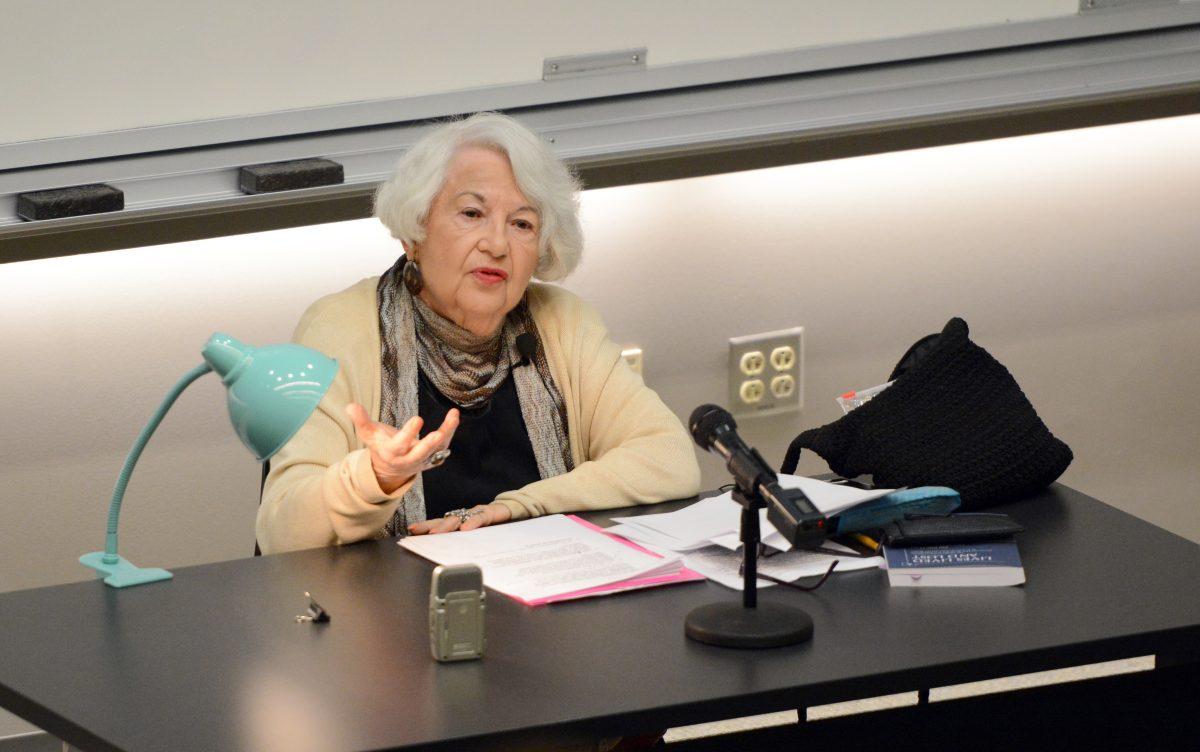On Jan. 31, Sheldon “Shelly” Bleiweiss came to speak at Talley Student Union to commemorate Holocaust Remembrance Day, honoring 77 years since the genocide of six million Jews and millions of others who were killed.
The son of Polish Holocaust survivors who escaped Eastern European death camps just before the end of WWII, Bleiweiss was born in Houston, Texas in 1947 just a few years after the war’s end, raised safely in the U.S. thanks to his parents’ ingenuity in using fake identities in their escape. Following the death of his parents, Bleiweiss often visited the Houston Holocaust Museum where his parents’ names were listed on the wall among those of 300 other survivors who lived in Houston after the war.
Although he is not a firsthand witness to the trauma his parents faced during the war, Bleiweiss emphasizes the critical value of passing on the torch of education. He first found his calling for spreading awareness at an agency for Jewish education near his home in Texas, where a friend asked him to substitute a current events class.
Reviewing the newspapers and curriculum that the class analyzed, Bleiweiss was shocked at the lack of review or discussion surrounding the Second World War and the Holocaust, less than 80 years ago. Determined to open the minds of his students, he designed a curriculum for them. From there, his spark for teaching was ignited.
“So I started working on, ‘What do kids need to know about and what is it, how do we prevent that?’” Bleiweiss said. “‘How do we make them start understanding or help them start understanding what it was like, to kind of go through the Holocaust?’”
This past year, Bleiweiss worked with the North Carolina State Council of the Holocaust and other organizations to implement the Holocaust curriculum in the public school system.
Moreover, the state legislature has approved the law and designated funds so that he and other council members can develop the workshops. He emphasizes the impact of this huge success, especially in view of the fact that most states do not mandate Holocaust education as part of the curriculum.
The classes he instructs explore the deeply rooted hate, antisemitism, and strong feelings of inherent indifference that lead to the tragic genocide. They discuss texts like the famed “Night”by Elie Wiesel, in addition to surveying and analyzing recent Jewish hate crimes such as the Pittsburgh shooting, or the recent hostage incident in Texas in which an armed assailant took four people hostage in the Congregation Beth Israel synagogue in Colleyville, Texas, during a Sabbath service.
“All the ills of society gets blamed on the Jews. … The Holocaust did not start with gas chambers, it started with people talking, politicians dividing people into ‘us’ and ‘them,’” Bleiweiss said. “Once you do that, it’s very easy to treat those people differently. When we start discriminating against certain groups of people, then it quickly continues with concluding that they don’t really belong with us, they need to go over there.”
Bleiweiss discussed his experience attending the first international conference for children of Holocaust survivors in New York City, in which Wiesel was the main speaker. A recognized Holocaust survivor, known writer, political activist and Nobel laureate, Wiesel left a strong impression on Bleiweiss.
“He said a couple of things to us — one, we were the ones that Hitler wanted to kill,” Bleiweiss said. “He wanted to destroy the Jews, you go after the next generation. Secondly, he said, ‘Who’s going to tell the stories after the survivors are gone? How do we pass the torch?’ And he said, ‘As you guys, you know, you’re the children. You’re not the personal witnesses, the firsthand witnesses, but you’re the next.’”
In 2002, Bleiweiss was one of the mental health counselors accompanying several thousand high school students on the week-long “March of the Living” trip to Poland as they explored the remnants of Jewish life there and toured some of the death camps. In 2004, he was selected by the International School of Holocaust Studies at Yad Vashem in Jerusalem to participate in a two-week seminar on “Teaching the Holocaust.”
Since moving to North Carolina in 2014 with his wife’s family, Bleiweiss has traveled throughout the state, talking to hundreds of schools, churches and community groups. Bleiweiss is also a member of the North Carolina State Council on the Holocaust and the Holocaust Speakers Bureau of North Carolina. A docent and Holocaust educator for Adult Education at Temple Beth Or in Raleigh, Bleiweiss also teaches several fascinating courses on the Holocaust and Anti-Semitism for the Osher Lifelong Learning Institute program at Duke University.
Recalling the stories of his parents and the ordeals of many survivors and their families he has met, Bleiweiss is committed more than ever to pass on the torch, important knowledge that will continue to live for generations to come.














